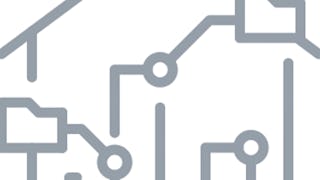Dies ist der dritte von sieben Kursen des Google Advanced Data Analytics Certificate. In diesem Kurs lernen Sie, wie Sie die Geschichte in den Daten finden und diese Geschichte auf fesselnde Weise erzählen können. Sie erfahren, wie Datenexperten das Storytelling nutzen, um ihre Daten besser zu verstehen und Teamkollegen und Stakeholdern wichtige Erkenntnisse zu vermitteln. Außerdem üben Sie sich in der explorativen Datenanalyse und lernen, wie Sie effektive Datenvisualisierungen erstellen.



Gehen Sie über die Zahlen hinaus: Daten in Einsichten verwandeln
Dieser Kurs ist Teil von Google Erweiterte Datenanalyse (berufsbezogenes Zertifikat)

Dozent: Google Career Certificates
TOP-LEHRKRAFT
63.708 bereits angemeldet
Bei  enthalten
enthalten
(738 Bewertungen)
Was Sie lernen werden
Anwendung des Prozesses der explorativen Datenanalyse (EDA)
Entdecken Sie die Vorteile der Strukturierung und Bereinigung von Daten
Untersuchen von Rohdaten mit Python
Erstellen von Datenvisualisierungen mit Tableau
Wichtige Details

Zu Ihrem LinkedIn-Profil hinzufügen
20 Quizzes, 1 Aufgabe
Erfahren Sie, wie Mitarbeiter führender Unternehmen gefragte Kompetenzen erwerben.

Erweitern Sie Ihr Fachwissen im Bereich Datenanalyse
- Lernen Sie neue Konzepte von Branchenexperten
- Gewinnen Sie ein Grundverständnis bestimmter Themen oder Tools
- Erwerben Sie berufsrelevante Kompetenzen durch praktische Projekte
- Erwerben Sie ein Berufszertifikat von Google zur Vorlage


Erwerben Sie ein Karrierezertifikat.
Fügen Sie diese Qualifikation zur Ihrem LinkedIn-Profil oder Ihrem Lebenslauf hinzu.
Teilen Sie es in den sozialen Medien und in Ihrer Leistungsbeurteilung.

In diesem Kurs gibt es 5 Module
Sie lernen, wie Sie die Geschichten in den Daten finden und sie mit Ihrem Publikum teilen können. Sie lernen die Methoden und Vorteile der Datenbereinigung kennen und erfahren, wie diese Ihnen helfen kann, diese Geschichten zu entdecken. Sie werden auch die Schritte des EDA-Prozesses durchgehen und lernen, wie EDA Ihnen helfen kann, Daten schnell zu verstehen. Schließlich werden Sie verschiedene Möglichkeiten zur Visualisierung von Daten kennenlernen, um wichtige Erkenntnisse zu vermitteln.
Das ist alles enthalten
8 Videos5 Lektüren2 Quizzes1 Aufgabe2 Plug-ins
Bei der Suche nach Geschichten in Daten mithilfe von EDA geht es darum, Rohdaten zu organisieren und zu interpretieren. Python kann Ihnen dabei helfen, dies schnell und effektiv zu tun. Sie lernen, wie Sie Python verwenden, um die EDA-Praktiken des Entdeckens und Gestaltens durchzuführen.
Das ist alles enthalten
9 Videos6 Lektüren4 Quizzes7 Unbewertete Labore2 Plug-ins
Sie werden drei weitere EDA-Praktiken kennenlernen: Bereinigung, Verknüpfung und Validierung. Sie werden die Bedeutung dieser Verfahren für die Datenanalyse entdecken und Python verwenden, um Daten zu bereinigen, zu validieren und zu verknüpfen.
Das ist alles enthalten
11 Videos6 Lektüren5 Quizzes5 Unbewertete Labore2 Plug-ins
Sie üben das Erstellen und Präsentieren von Datengeschichten in einer ethischen, zugänglichen und professionellen Weise. Außerdem lernen Sie fortgeschrittene Datenvisualisierungstechniken in Tableau kennen.
Das ist alles enthalten
8 Videos11 Lektüren5 Quizzes2 Plug-ins
In diesem Projekt zum Abschluss des Kurses üben Sie die Verwendung von Python zur Durchführung von EDA an einem Datensatz für ein Arbeitsplatzszenario. Anschließend verwenden Sie Python und Tableau, um die Daten zu visualisieren.
Das ist alles enthalten
4 Videos10 Lektüren4 Quizzes6 Unbewertete Labore
Dozent

von
Empfohlen, wenn Sie sich für Datenanalyse interessieren
Warum entscheiden sich Menschen für Coursera für ihre Karriere?




Bewertungen von Lernenden
738 Bewertungen
- 5 stars
82,24 %
- 4 stars
13 %
- 3 stars
2,03 %
- 2 stars
1,35 %
- 1 star
1,35 %
Zeigt 3 von 738 an
Geprüft am 11. Feb. 2024
Very well designed course for anyone having experience of any field willing to dive into data analytics.
Geprüft am 19. Dez. 2023
The Course was very effective which increased my skills, knowledge and confidence level.
Geprüft am 27. Aug. 2024
Nice to learn about tools for analyzing data in python! It made my world of data analytics much bigger

Neue Karrieremöglichkeiten mit Coursera Plus
Unbegrenzter Zugang zu 10,000+ Weltklasse-Kursen, praktischen Projekten und berufsqualifizierenden Zertifikatsprogrammen - alles in Ihrem Abonnement enthalten
Bringen Sie Ihre Karriere mit einem Online-Abschluss voran.
Erwerben Sie einen Abschluss von erstklassigen Universitäten – 100 % online
Schließen Sie sich mehr als 3.400 Unternehmen in aller Welt an, die sich für Coursera for Business entschieden haben.
Schulen Sie Ihre Mitarbeiter*innen, um sich in der digitalen Wirtschaft zu behaupten.
Häufig gestellte Fragen
Unternehmen jeder Art und Größe haben Geschäftsprozesse, bei denen riesige Datenmengen anfallen. Jeden Moment werden alle Arten von Informationen von Computern, dem Internet, Telefonen, Texten, Streaming-Videos, Fotos, Sensoren und vielem mehr erzeugt. In der globalen digitalen Landschaft sind die Daten zunehmend unpräzise, chaotisch und unstrukturiert. Da die Geschwindigkeit und Vielfalt der Daten exponentiell zunimmt, haben Unternehmen Schwierigkeiten, damit Schritt zu halten.
Datenwissenschaft und fortgeschrittene Data Analytics sind Teil eines Fachgebiets, das Rohdaten nutzt, um neue Wege der Modellierung und des Verständnisses des Unbekannten zu schaffen. Um Erkenntnisse zu gewinnen, sind Unternehmen auf Datenexperten angewiesen, die Daten erfassen, organisieren und interpretieren, um sie für interne Projekte und Prozesse zu nutzen. Datenwissenschaftler und fortgeschrittene Fachkräfte für Datenanalyse stützen sich auf eine Kombination wichtiger Fähigkeiten, darunter Statistik, wissenschaftliche Methoden, Datenanalyse und künstliche Intelligenz.
Ein Datenexperte ist ein Begriff, der jede Person beschreibt, die mit Daten arbeitet und/oder über Datenkenntnisse verfügt. Ein Datenexperte ist zumindest in der Lage, Daten zu erkunden, zu bereinigen, auszuwählen, zu analysieren und zu visualisieren. Sie können auch gut mit dem Schreiben von Code umgehen und sind mit den Techniken vertraut, die von Statistikern und Ingenieuren für maschinelles Lernen verwendet werden, einschließlich der Erstellung von Modellen, der Entwicklung algorithmischen Denkens und der Erstellung von Modellen für maschinelles Lernen.
Datenexperten sind für das Sammeln, Analysieren und Interpretieren großer Datenmengen in einer Vielzahl unterschiedlicher Organisationen verantwortlich. Die Rolle eines Datenexperten wird von Unternehmen zu Unternehmen unterschiedlich definiert. Im Allgemeinen verfügen Datenexperten über technische und strategische Fähigkeiten, die fortgeschrittene analytische Fähigkeiten wie Datenmanipulation, Versuchsplanung, prädiktive Modellierung und maschinelles Lernen erfordern. Sie führen eine Vielzahl von Aufgaben im Zusammenhang mit dem Sammeln, Strukturieren, Interpretieren, Überwachen und Berichten von Daten in zugänglichen Formaten aus, damit die Beteiligten die Daten verstehen und effektiv nutzen können. Letztlich hilft die Arbeit von Datenexperten Organisationen, fundierte, ethische Entscheidungen zu treffen.
Große Datenmengen - und die zur Verwaltung und Analyse dieser Daten erforderliche Technologie - werden immer leichter zugänglich. Aus diesem Grund gibt es immer mehr Karrieremöglichkeiten für Menschen, die mithilfe von Daten Geschichten erzählen können, wie z. B. leitende Fachkräfte für Datenanalyse und Data Scientists. Diese Fachleute sammeln, analysieren und interpretieren große Datenmengen in einer Vielzahl unterschiedlicher Organisationen. Ihre Aufgaben erfordern fortgeschrittene analytische Fähigkeiten wie Datenmanipulation, Versuchsplanung, Prognosemodellierung und maschinelles Lernen.





